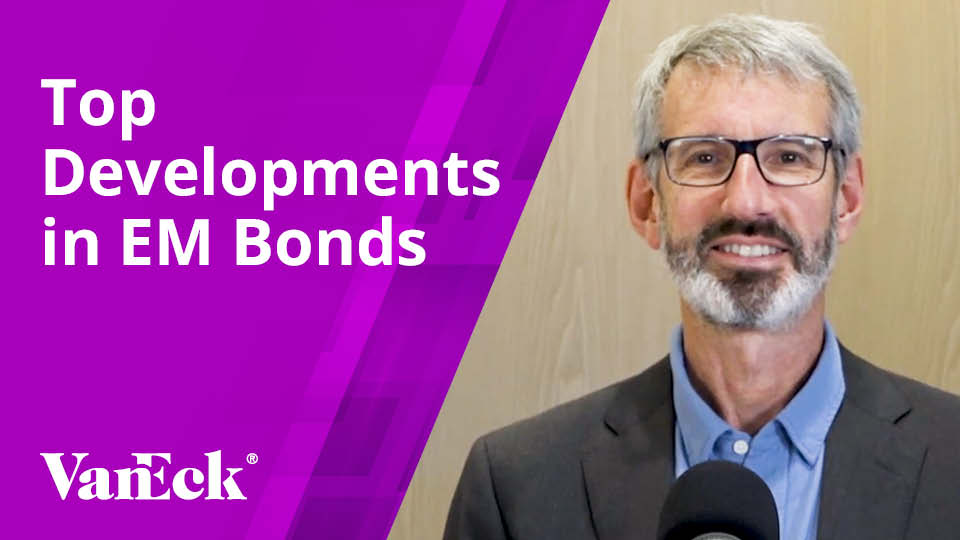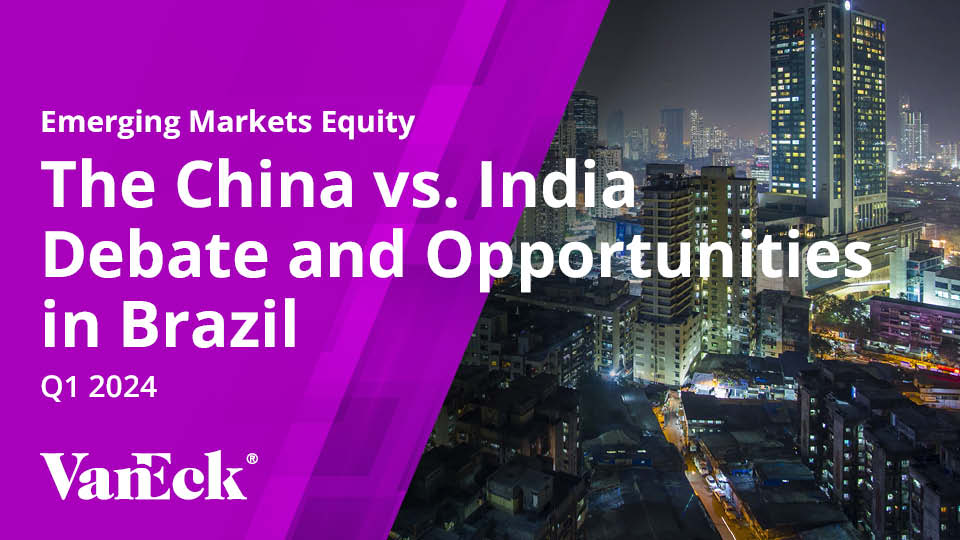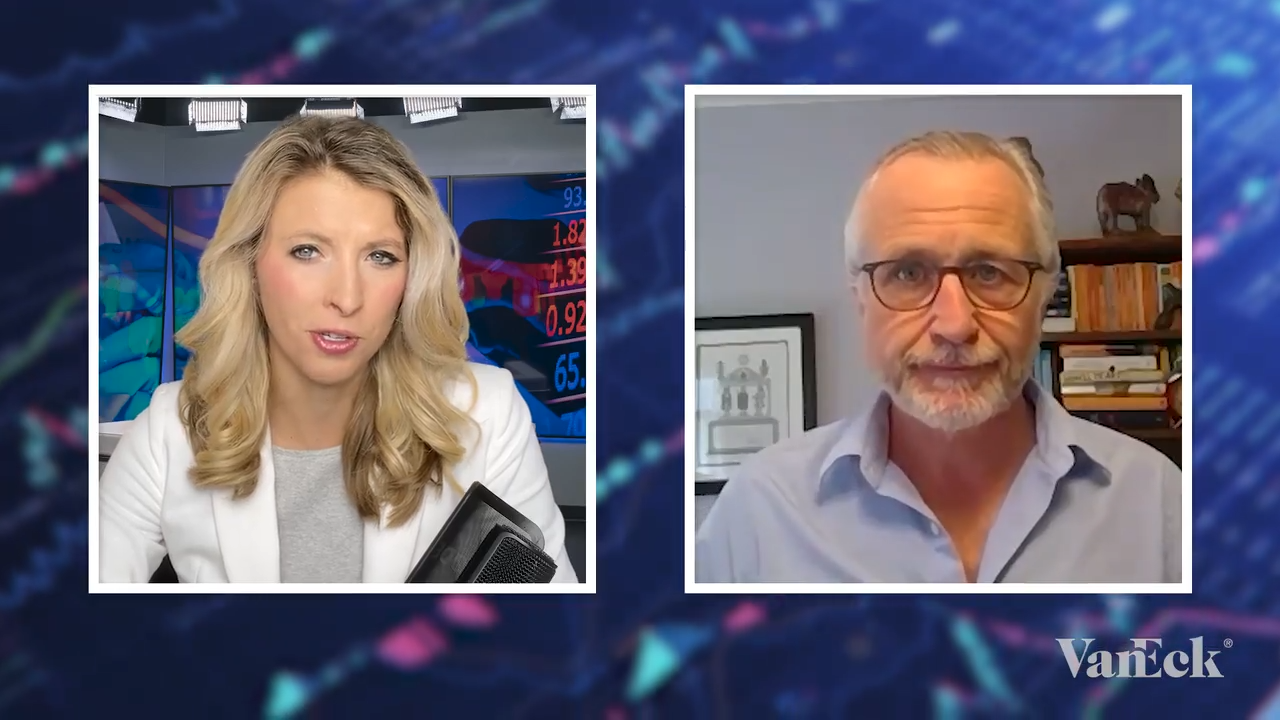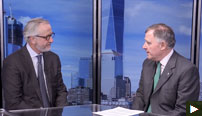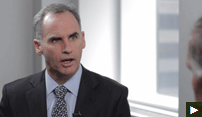Emerging Markets Outlook for 2021
02 March 2021
Watch Time 8:39
Jenna Dagenhart: Joining us to share where he's finding opportunities today in emerging markets [EM] is David Semple. He's portfolio manager of VanEck Emerging Markets Equity. David, why should investors consider EM stocks as part of their portfolio allocation for 2021 and beyond?
David Semple: Hi, Jenna. Well, I think it's pretty exciting times for emerging markets. We've had this situation where, in medical terms, our response to COVID has actually been quite good, either because they've been able to lock down and excise the spread or stop the spread of the virus, or because for a combination of reasons, it hasn't actually impacted the countries in such a deep way. And it might be because there are younger populations being exposed to existing pathogens or whatever. But in any event, COVID is starting to work its way out of the system in emerging markets, which is good because vaccines will be a little bit behind in emerging markets. And that means that we've seen real economic recovery in many places. Clearly, Northeast Asia has done better in that respect. So, China grew last year, the only major economy to grow. But also, other countries. You're seeing an increase in terms of mobility and an increase in terms of economic activity.
David Semple: And then the final point I'd make on this is that this has all been done without so much support in terms of monetary and fiscal policy, particularly vis-a-vis developed markets. So, if you think about fiscal policy as basically borrowing growth from future years, because the more that you spend now in terms of government fiscal expenditure, the more you have to pay back in due course. So, either because they haven't had to because the economies have actually done quite well or because they haven't been able to because they don't want to have a very significant weakness in their currency, emerging markets countries have not borrowed that growth. So, they look very well set up in economic terms going forward.
Jenna Dagenhart: That's an excellent point. And looking at smaller countries and companies, do you think that they'll do well in EM going forward?
David Semple: I think there's a solid case for that as we move further into the recovery scenario. It's very easy to point to China, Korea, Taiwan Region, in terms of beneficiaries from what's going on in relative sense, and economically they've done well. They also tend to be very well geared up towards things like supplying technology from work from home or implementing technology in terms of what happens in China and their use of technology. But as we move forward into next year, there's a bit of a higher beta perhaps for some of those countries that were harder impacted. So that would be, for instance, Latin America or South Africa. Those types of countries could move back.
David Semple: And then small companies is actually a really interesting part of the puzzle. So far this year and last year, the larger companies, the mega caps, have done very well in emerging markets. I think part of that is structural, part of that, however, is simply where people tend to put their money in the first instance in terms of a recovery for markets. And then that tends to dissipate down to smaller countries, which tend to be very much beneficiaries of what's happening in their domestic economy. And we believe that we have some really interesting stocks in small and mid-cap. As you know, we're a true all-cap fund, so we really invest quite significantly in the small and mid-cap names, and hopefully we find some little gems that are going to grow into bigger gems. And I think we're very enthusiastic about the outlook for most of those companies.
Jenna Dagenhart: Thanks, David. I know you and your team have always been forward looking and focused on new sustainable structural growth areas. With that, let's take a closer look at VanEck's white paper on the disruption of fintech across emerging markets. As we entered 2020, digitization was already sweeping in the developing world, but then COVID-19 sparked an unprecedented uptick in the pace of adoption and integration. As the pandemic unfolded, an acceleration of stay-at-home behavior really took off and doing business digitally became more of a necessity than a choice.
Jenna Dagenhart: We saw this shift to play out across industries and sectors, especially in fintech, telecoms, e-commerce, health tech and online food delivery. As a result of this higher online penetration, it's estimated that nearly $2 trillion has been transferred from offline to online. Still, VanEck points out that many households don't yet have access to a smartphone, which could make emerging markets even more fintech fertile in the future if they can crack that affordability code.
Jenna Dagenhart: Joining us now to share her take on some of these trends is Ola El-Shawarby. She's senior analyst at VanEck Emerging Markets Equity. Ola, as it relates to digitization as an investment theme, could you please give us an example or two of portfolio companies that directly benefited from this theme?
Ola El-Shawarby: Sure. Hi, Jenna. Definitely, like you said, we've seen a very strong acceleration in the digitization trend in 2020. And one company that I would like to talk about, and specifically in the fintech space that you mentioned, is a company called Fawry. It's the largest electronic payments company in Egypt. And just for context, Egypt is still very much cash based because only about a third of the population actually have a bank account. So Fawry saw the opportunity and they started out originally as a bill payments company by partnering up with small kiosks that basically collect cash from people and then use that cash to electronically pay their bills.
Ola El-Shawarby: Over the course of the years, they've basically grown very much in size to reach now 29 million customers on their platform and almost 170,000 of these merchant partners across the country. And as you reach that level of scale, they've been continuously adding further services to support this transition from cash payments to cashless or digital payments. So now they provide online gateways. They also have digital wallets, and they're even providing working capital financing to the small merchants to support their growth. So, this is one company that we're actually very excited about and think there are further legs for growth going forward.
Ola El-Shawarby: Moving further down the continent to Sub-Saharan Africa, another company that's actually also a beneficiary of digitization is a company called Helios Towers. It's a telecom infrastructure company that's listed in London, but all their operations are basically in Sub-Saharan countries and some of the more interesting and less accessible countries like the DRC, Tanzania, Ghana. And those are countries where mobile penetration still remains below 50%. But as the world becomes more and more connected, what we're seeing is a further need for telecom infrastructure, and that's where Helios Towers steps in by building more and more towers.
Ola El-Shawarby: There's also an interesting and exciting M&A story there because mobile network operators have been globally offloading some of their existing towers to independent tower companies like Helios Towers. So, we think the runway for growth, structurally, is quite long from here. And the company, I should also mention, stacks up quite well from an ESG perspective, because from a social standpoint, connectivity is key for social economic development. But then environmentally also, given that you're having a more consolidated and efficient network, that uses up less power to increase connectivity, and that's something that governments in these countries are quite supportive of. So, these are two examples that we quite like and beneficiaries of digitization in two different ways.
Jenna Dagenhart: You're absolutely right. Connectivity is key and the world is more and more connected.
Jenna Dagenhart: Well, thank you so much for joining us and to learn more about the disruption of fintech across emerging markets, you can click on the link in this video.




